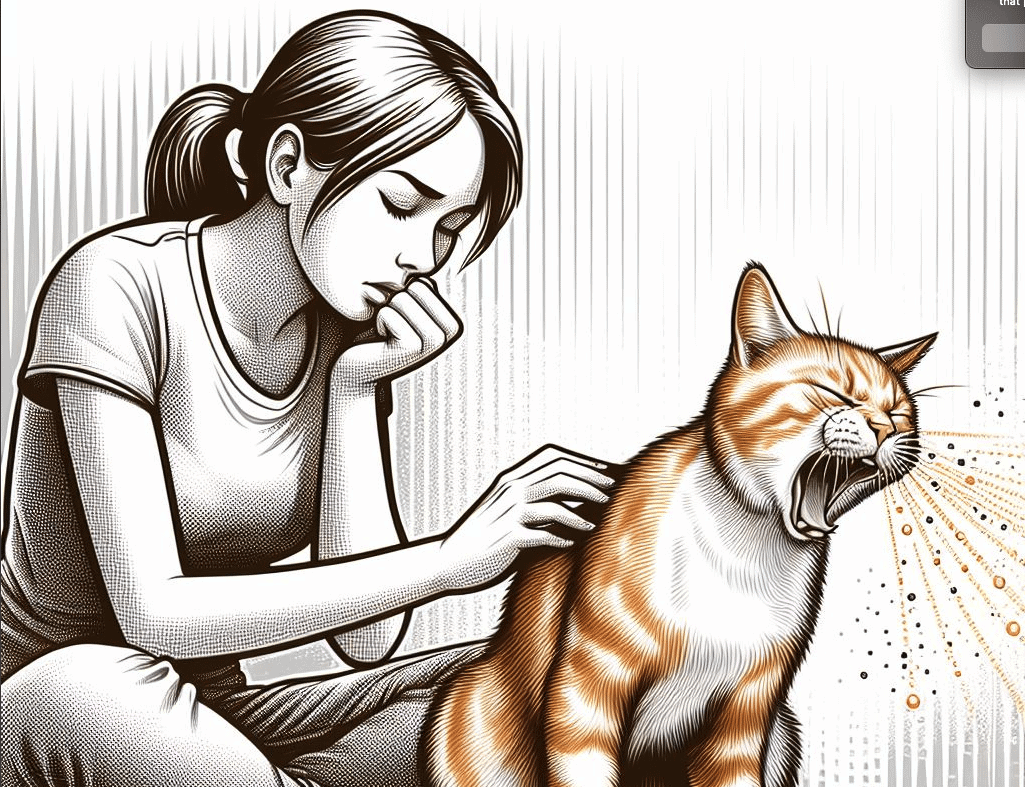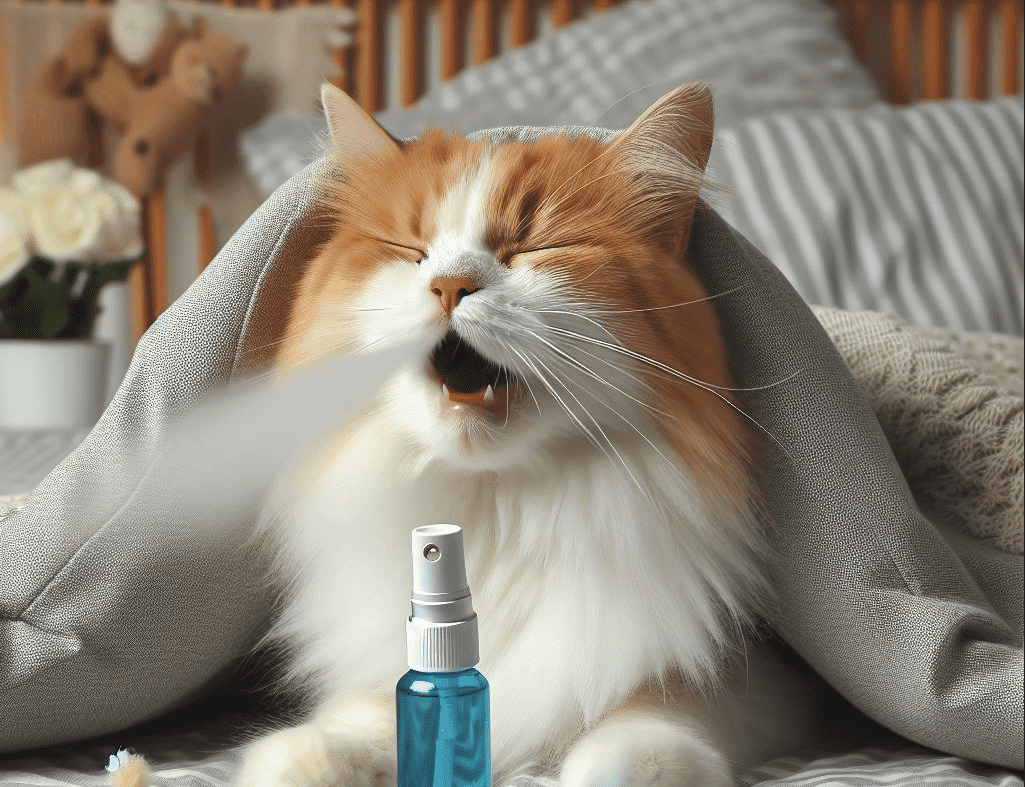Is your cat sneezing more than usual? Are you wondering what you can do to help alleviate their symptoms?
Excessive cat sneezing is a cause for concern, as it may indicate an underlying issue that requires attention. Understanding the causes of cat sneezing can help provide them with appropriate treatment and relief.
Whether it’s allergies, infections, dental problems, foreign objects, or even cancer, there are steps you can take to help your cat feel better.
In this article, I will explore the different causes of cat sneezing and provide effective remedies and treatments to relieve your feline companion of their frequent sneezing.

Eight Reasons Behind Sneezing in Cats
Cats can experience sneezing due to a variety of reasons. Understanding the underlying causes can help you identify and address the issue effectively. Here are some common causes of cat sneezing:
1. Nose Tickle
A nose tickle occurs when something lightly stimulates the sensitive nasal passages of a cat. Common triggers include fine dust particles, air pollutants, or allergens. The sensation prompts the cat to expel the irritants through sneezing, a natural defense mechanism to clear the nasal passages.
2. Strong Chemical Smell
Cats have a heightened sense of smell, making them susceptible to strong chemical odors. Exposure to harsh chemicals like cleaning agents, paint fumes, or perfumes can irritate the nasal lining, leading to sneezing. The cat’s reflexive response aims to rid the respiratory system of the irritant.
3. Allergies
Allergic reactions in cats can be triggered by various allergens such as pollen, dust mites, certain foods, or insect bites. When an allergen enters the cat’s system, the immune response may manifest as sneezing. The body’s attempt to eliminate the allergen results in repetitive sneezing episodes.
4. Viral Infections
Cat viral infections, particularly feline herpesvirus and calicivirus, target the respiratory system. These viruses can cause inflammation in the nasal passages and sinuses, leading to sneezing. Cats infected with these viruses may exhibit sneezing as a primary symptom, often accompanied by nasal discharge and fever.
5. Bacterial Infections
Bacterial infections in cats can affect the upper respiratory tract, leading to symptoms like sneezing. Bacteria like Chlamydia and Bordetella can cause irritation and inflammation in the nasal passages, prompting the cat to sneeze as a means of clearing the infection. Bacterial infections may require antibiotic treatment.
6. Dental Disease
Dental issues in cats, such as periodontal disease or tooth abscesses, can extend to the nasal cavity. Bacteria from infected teeth can spread to the sinuses, triggering sneezing. Dental disease-related sneezing may indicate secondary complications requiring dental intervention to address the underlying infection.
7. Foreign Object
Cats, known for their inquisitive nature, may inhale or ingest foreign objects like small toys, grass, or dust particles. These objects can become lodged in the nasal passages, causing irritation and sneezing. The cat’s reflexive response aims to dislodge the foreign material through forceful expulsions.
8. Cancer
Nasal tumors or cancers in cats are uncommon but can lead to chronic sneezing. Tumors developing in the nasal cavity may obstruct airflow, trigger inflammation, and cause persistent sneezing. The presence of cancerous growths in the nasal region can disrupt normal respiratory function, resulting in frequent sneezing episodes.
Common Cause #1: Sneezing Due to Allergies
Allergies are a common cause of frequent sneezing in cats. If your cat sneezes more than usual, it may be experiencing allergies.
Symptoms of Allergies:
- coughing
- wheezing
- itchy eyes
- runny eyes
- ear infections
- vomiting
- diarrhea, snoring
- trouble breathing
- swollen paws
- excessive licking or grooming
- red or dry skin
- excessive scratching
Allergies can be categorized into different types, including insect allergies, food allergies, and environmental allergies.
Allergy Type |
Example Allergens |
|---|---|
| Insect Allergies | Flea bites, tick bites, mosquito bites |
| Food Allergies | Poultry, fish, grains, dairy products |
| Environmental Allergies | Pollen, mold, dust mites, certain chemicals |
Consulting with a veterinarian is crucial to determine the specific allergy affecting your cat and provide appropriate treatment. The vet may recommend allergy testing to identify the specific allergens causing the reaction.
Treatment options may include medications to manage symptoms, such as antihistamines or corticosteroids, or changes in diet to remove allergenic ingredients.
Environmental modifications, such as reducing exposure to allergens or using air purifiers, may help alleviate your cat’s allergy symptoms.
Common Cause #2: Sneezing Due to Infections
Infections, both viral and bacterial, can lead to sneezing in cats. Cats can be susceptible to several common viral infections, with Feline Herpesvirus type-1 (FVR) and Feline Calicivirus (FCV) being the most prevalent.
On the other hand, bacterial infections such as Bordetella Bronchiseptica and Chlamydophila Felis can also cause sneezing in cats.
When a cat is infected with a virus or bacteria, it can exhibit a range of symptoms.
These symptoms may include sneezing, coughing, nasal congestion and discharge, inflamed eyelids, loss of appetite, lethargy, fever, enlarged lymph nodes, and difficulty breathing.
It’s important to monitor your cat closely for any of these signs and seek veterinary care if they persist or worsen.
Treatment options for viral and bacterial infections in cats will depend on the specific type of infection.
In the case of viral infections, antiviral medications may be prescribed to alleviate symptoms and help the cat recover. Bacterial infections will typically require antibiotics to eliminate the bacteria causing the infection.
Symptoms of Viral Infections
- Sneezing
- Coughing
- Nasal congestion and discharge
- Inflamed eyelids
- Loss of appetite
- Lethargy
- Fever
- Enlarged lymph nodes
- Difficulty breathing
Symptoms of Bacterial Infections
- Sneezing
- Coughing
- Nasal congestion and discharge
- Inflamed eyelids
- Loss of appetite
- Lethargy
- Fever
- Enlarged lymph nodes
- Difficulty breathing

Common Cause #3: Dental Disease and Sneezing
Dental disease can contribute to sneezing in cats. Three main types of dental disease can cause sneezing: gingivitis, periodontitis, and tooth resorption.
These dental issues can lead to discomfort and inflammation in the mouth, which can affect the nasal passages, causing the cat to sneeze.
Symptoms of Dental Disease:
- Swollen or tender gums
- Inflammation
- Bleeding
- Pain
- Lack of appetite
- Difficulty eating
To address dental disease and prevent further complications, it is important to provide proper dental care for your cat.
This includes brushing their teeth regularly, providing dental-friendly toys and treats, and scheduling regular veterinary check-ups. During these check-ups, your veterinarian can assess your cat’s dental health, perform cleanings if necessary, and address any dental issues that may be contributing to their sneezing.
Type of Dental Disease |
Symptoms |
|---|---|
| Gingivitis | Swollen or tender gums, redness, bleeding |
| Periodontitis | Gum recession, tooth mobility, bad breath, pus |
| Tooth Resorption | Tooth fractures, cavities, enamel loss, root exposure |
Uncommon Cause #1: Sneezing Caused by Foreign Objects
Although uncommon, sneezing in cats can be triggered by the presence of a foreign object in their nasal passage.
If your cat starts sneezing excessively and exhibits symptoms such as coughing and difficulty breathing, it is essential to take immediate action.
Choking can be life-threatening for cats, so contacting your veterinarian promptly is crucial for their well-being.
Your veterinarian will perform a thorough examination and may need to conduct X-rays or even surgery to safely remove the foreign object and alleviate your cat’s sneezing. It is important not to attempt to remove the object yourself, as this can lead to further complications.
Uncommon Cause #2: Sneezing and Cancer in Cats
While rare, cats with cancer can experience sneezing as a symptom. Other signs of cancer may include unexplained weight loss, lack of appetite, vomiting, diarrhea, lumps, lethargy, unexplained bleeding, and wounds that don’t heal.
If cancer is suspected, it is important to consult with a veterinarian for a proper diagnosis and to discuss appropriate treatment options, which can range from surgery to chemotherapy or radiation therapy.
Symptom |
Description |
|---|---|
| Unexplained weight loss | Noticeable reduction in weight without any changes in diet or activity levels. |
| Lack of appetite | Decreased interest in eating or complete refusal to eat, leading to weight loss. |
| Vomiting | Frequent episodes of throwing up food, liquids, or bile. |
| Diarrhea | Loose, watery stools that may persist for an extended period. |
| Lumps | Presence of unusual growths or swellings on the body that persist or grow. |
| Lethargy | Unusual tiredness, lack of energy, or reluctance to engage in normal activities. |
| Unexplained bleeding | Bleeding from any part of the body without a clear cause, such as the nose, gums, or anus. |
| Wounds that don’t heal | Sores or open wounds that remain unhealed for an unusually long time. |

Treatment Options for Cat Sneezing
The treatment options for cat sneezing will depend on the underlying cause. Here are some treatment options to consider:
Allergies
If your cat is experiencing sneezing due to allergies, your veterinarian may recommend allergy medications to help manage symptoms and provide relief.
An elimination diet may also be recommended to identify and eliminate allergens.
Infections
In the case of viral or bacterial infections causing cat sneezing, antiviral or antibiotic treatments may be prescribed by your veterinarian. These medications can help combat the infection and alleviate symptoms.
Dental Disease
Addressing dental disease is crucial to reducing cat sneezing. Dental treatments, such as professional cleanings and tooth extractions, may be recommended to improve oral health and sneezing episodes. Regular dental care at home, such as brushing your cat’s teeth, can also help prevent dental issues.
Foreign Object Removal
If a foreign object is causing your cat’s sneezing, your veterinarian may perform an x-ray to identify the object and potentially recommend surgical removal. Prompt removal of the foreign object is essential to alleviate symptoms and prevent further complications.
Cancer
If cancer is the underlying cause of your cat’s sneezing, treatment options will vary based on the specific diagnosis. Surgery, chemotherapy, or radiation therapy may be recommended to target the cancer and improve your cat’s quality of life. Your veterinarian will guide you through the best course of action.
Consulting with a veterinarian is key in determining the appropriate treatment for cat sneezing. They will conduct a thorough examination, consider relevant tests or imaging, and provide a tailored treatment plan based on your cat’s needs.
Addressing Sneezing in Kittens and Elderly Cats
Kittens and elderly cats can experience sneezing for various reasons.
While occasional sneezing in kittens is usually not a cause for concern, persistent sneezing may indicate an infection or other underlying issue. It’s important to monitor them closely and seek veterinary attention if other symptoms arise.
Sneezing in elderly cats is normal due to age-related changes in the nasal passages.
However, older cats are more susceptible to infections and tumors, which could also be causing the sneezing. If sneezing becomes more frequent or is accompanied by other signs such as nasal discharge, coughing, difficulty breathing, or changes in appetite, it’s important to consult a veterinarian.

When to See a Vet for Kitten Sneezing
While occasional sneezing in kittens is usually not a cause for concern, there are situations where you should seek veterinary attention:
- If the sneezing is persistent and accompanied by nasal discharge
- If your kitten displays other symptoms such as coughing, wheezing, or difficulty breathing
- If your kitten’s appetite or behavior changes
When to See a Vet for Elderly Cat Sneezing
With elderly cats, occasional sneezing can be considered normal due to aging. However, it’s important to monitor their condition closely and consult with a veterinarian if:
- The frequency or severity of sneezing increases
- There is nasal discharge or difficulty breathing
- Your elderly cat shows other signs of illness such as weight loss, decreased appetite, or changes in behavior
Common Causes of Infections in Kittens and Elderly Cats
Infections can affect both kittens and elderly cats. Kittens are more susceptible to infections as their immune systems are still developing, while elderly cats may have a weakened immune system due to age-related changes.
The most common causes of infections in kittens and elderly cats include:
- Viral infections such as Feline Herpesvirus and Feline Calicivirus
- Bacterial infections like Bordetella Bronchiseptica and Chlamydophila Felis
If you suspect an infection in your kitten or elderly cat, it is important to seek veterinary care for proper diagnosis and treatment.
When to Seek Veterinary Attention for Cat Sneezing
While occasional sneezing may not require immediate veterinary attention, it is important to monitor your cat and seek professional advice if sneezing persists or is accompanied by other symptoms. Symptoms such as excessive nasal discharge, runny eyes, fatigue, coughing, trouble breathing, and loss of appetite should prompt a visit to the vet.
A veterinarian will perform a physical exam to evaluate your cat’s overall health. They may also conduct imaging tests, such as X-rays, to examine the nasal passages and identify any abnormalities. In some cases, a rhinoscopy, nasal lavage, or biopsy may be necessary to further investigate the underlying cause of the sneezing.
When to See a Vet for Cat Sneezing:
- Sneezing persists for more than a week.
- Sneezing is accompanied by other symptoms such as nasal discharge, runny eyes, fatigue, coughing, trouble breathing, or loss of appetite.
- Your cat is exhibiting signs of distress or discomfort.
- Your cat’s sneezing episodes have increased in frequency or intensity.
By seeking veterinary attention, you can ensure that your cat receives a proper diagnosis of the underlying cause of their sneezing. With an accurate diagnosis, the veterinarian can develop an appropriate treatment plan to alleviate the symptoms and improve your cat’s overall health.
Ending Thoughts
Remember, sneezing in cats is often a symptom of an underlying issue, and proper diagnosis is key to effective treatment. It is important to consult with your veterinarian to determine the cause and develop an appropriate treatment plan.
By addressing the underlying issues causing your cat’s frequent sneezing, you can help them find relief and improve their overall quality of life.
Helpful Reads
- https://allkindsvet.com/cat-sneezing/
- https://www.purina.co.uk/articles/cats/health/symptoms/cat-sneezing
- https://www.petmd.com/cat/symptoms/cat-sneezing

In her previous life, Lisa traveled extensively, both for work and leisure. After the pandemic struck, Lisa locked up her luggage and adopted a cat ever since.
Lisa is now an avid cat lover, she devotes most of her free time serving as butler to her adorable feline at home. When she is not with her cat, she can be seen using her phone sourcing for the latest cat supplies online.


